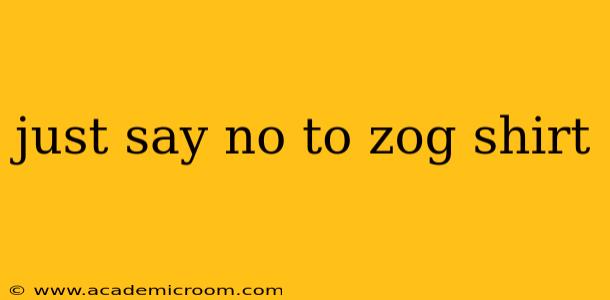Just Say No to Zog: Understanding the Anti-Zog Sentiment
The phrase "Just say no to Zog" isn't a simple slogan; it's a complex statement rooted in far-right extremist ideologies and antisemitic conspiracy theories. Understanding its meaning requires delving into the historical and contemporary context surrounding the term "ZOG," which is a coded reference used to promote hateful narratives. This article will explore the origins of the term, its implications, and the dangers associated with its use.
What does ZOG mean?
ZOG stands for "Zionist Occupational Government." It's a conspiracy theory that alleges a secret cabal of Jewish people secretly controls global governments and institutions. This belief system is deeply antisemitic and fuels dangerous narratives of Jewish world domination. It's crucial to understand that this claim is entirely baseless and rooted in historical antisemitic tropes.
Where did the term ZOG originate?
The precise origins of "ZOG" are difficult to pinpoint, but its usage is associated with extremist groups, particularly those with neo-Nazi and white supremacist leanings. The term gained traction in online spaces and has become increasingly prevalent among these groups as a way to disseminate their hateful ideologies under the guise of coded language.
Why is "Just Say No to Zog" dangerous?
The phrase's apparent simplicity masks its deeply harmful nature. By using seemingly innocuous language, proponents aim to normalize and spread antisemitic views. The statement is a call to action against a fictitious enemy, one built on a foundation of lies and prejudice. This rhetoric can incite hatred, violence, and discrimination against Jewish people and other marginalized communities.
How does this relate to antisemitism?
The "ZOG" conspiracy theory is a classic example of antisemitic tropes, echoing historical accusations of Jewish global control. These tropes, which have been used to justify persecution and violence against Jewish communities for centuries, are inherently dangerous and should be unequivocally condemned. The phrase "Just Say No to Zog" is a blatant expression of this dangerous ideology.
What are the real-world consequences of believing in ZOG?
Belief in the "ZOG" conspiracy theory can have devastating real-world consequences. It can lead to:
- Increased antisemitic violence: The dehumanization inherent in the conspiracy theory can fuel acts of violence and hatred directed at Jewish people.
- Social isolation and marginalization: Those who espouse these beliefs often isolate themselves from mainstream society, reinforcing extremist views.
- Erosion of democratic values: Conspiracy theories like this undermine trust in legitimate institutions and governmental processes.
- Spread of misinformation and hate speech: Online platforms often serve as breeding grounds for the dissemination of such hateful ideologies.
Is there a way to counter the spread of ZOG ideology?
Combating the spread of "ZOG" ideology requires a multi-faceted approach:
- Education: Educating people about the history of antisemitism and the dangers of conspiracy theories is crucial.
- Critical thinking: Encouraging critical thinking skills helps individuals identify and challenge misinformation.
- Platform accountability: Social media companies need to take stronger action against the spread of hate speech and conspiracy theories.
- Community building: Building strong, inclusive communities can help counter the isolation that fuels extremist ideologies.
The phrase "Just say no to Zog" is not a harmless statement; it is a dangerous call to action rooted in antisemitic conspiracy theories. Understanding its origins and implications is vital in combating the spread of hate and protecting vulnerable communities. Rejecting this harmful rhetoric is crucial to fostering a more inclusive and tolerant society.
